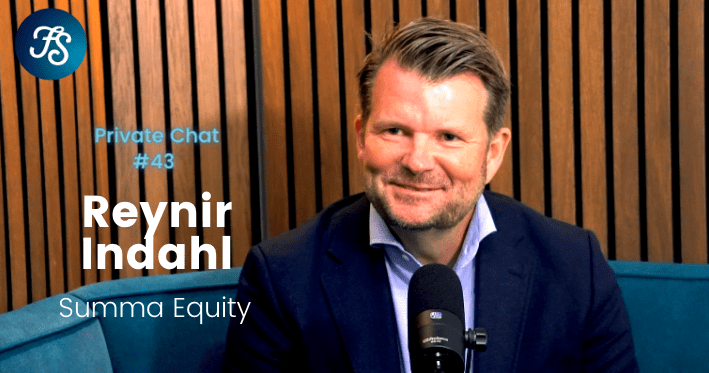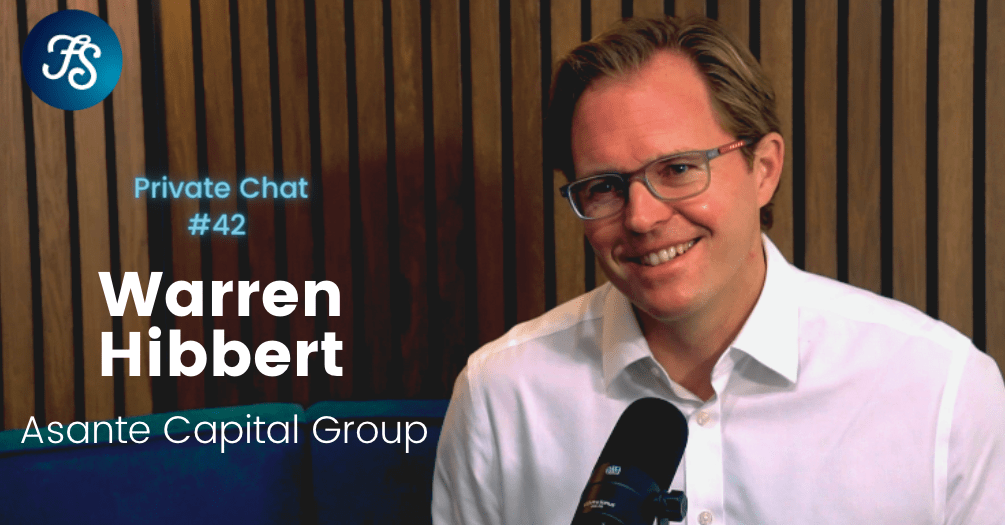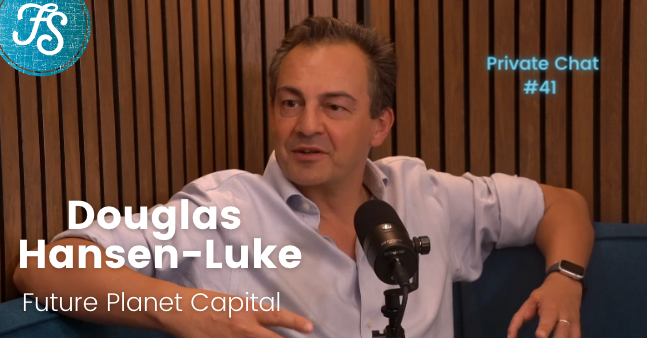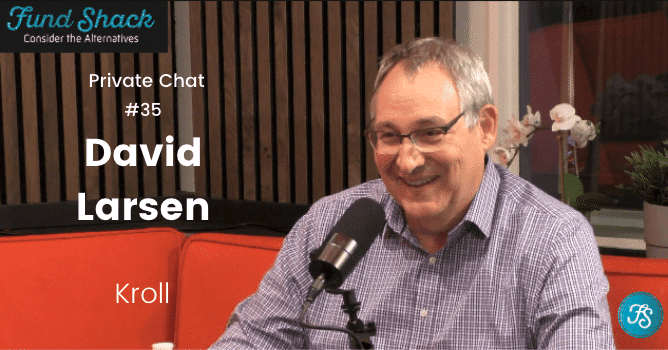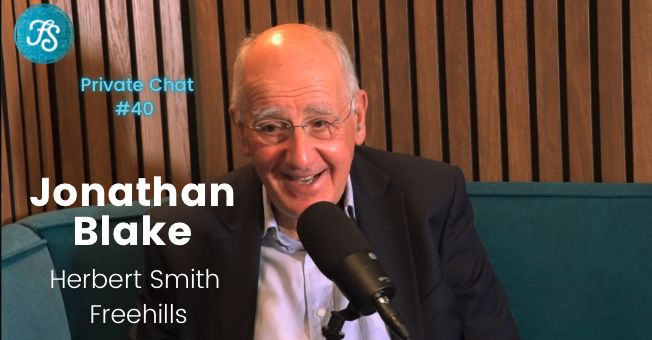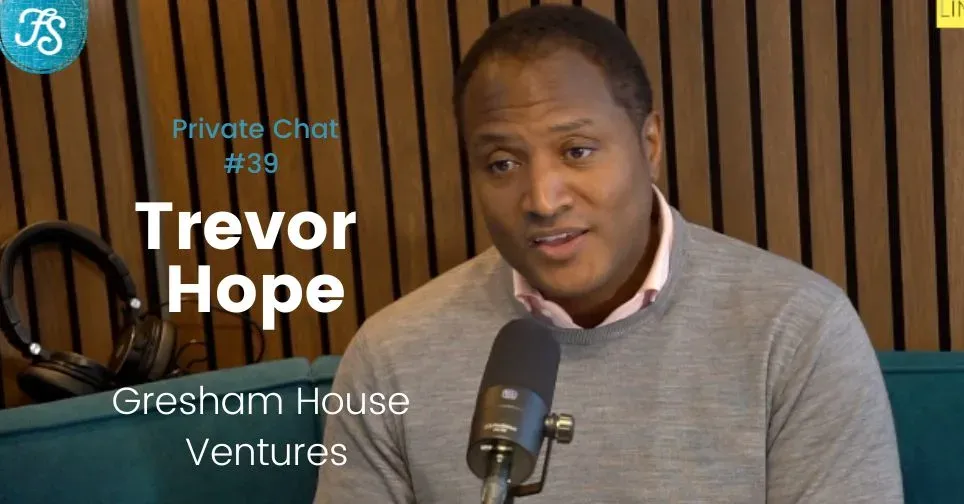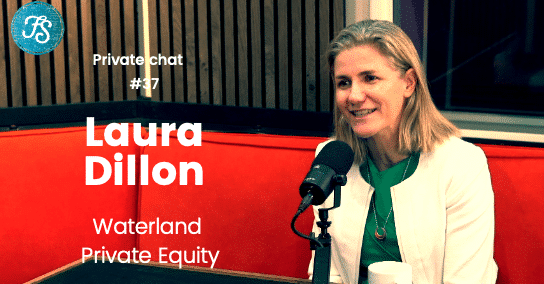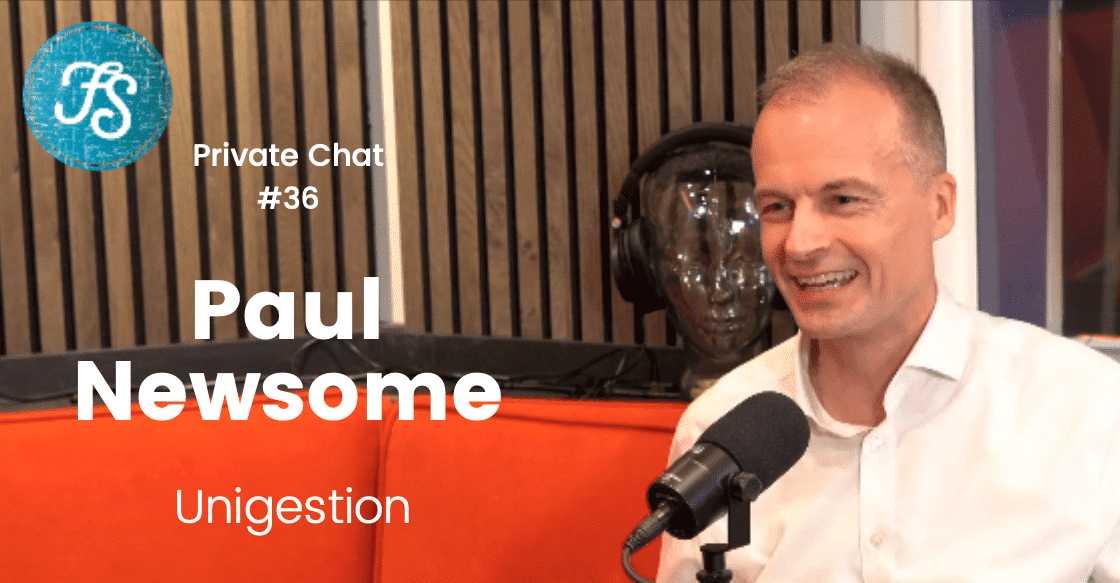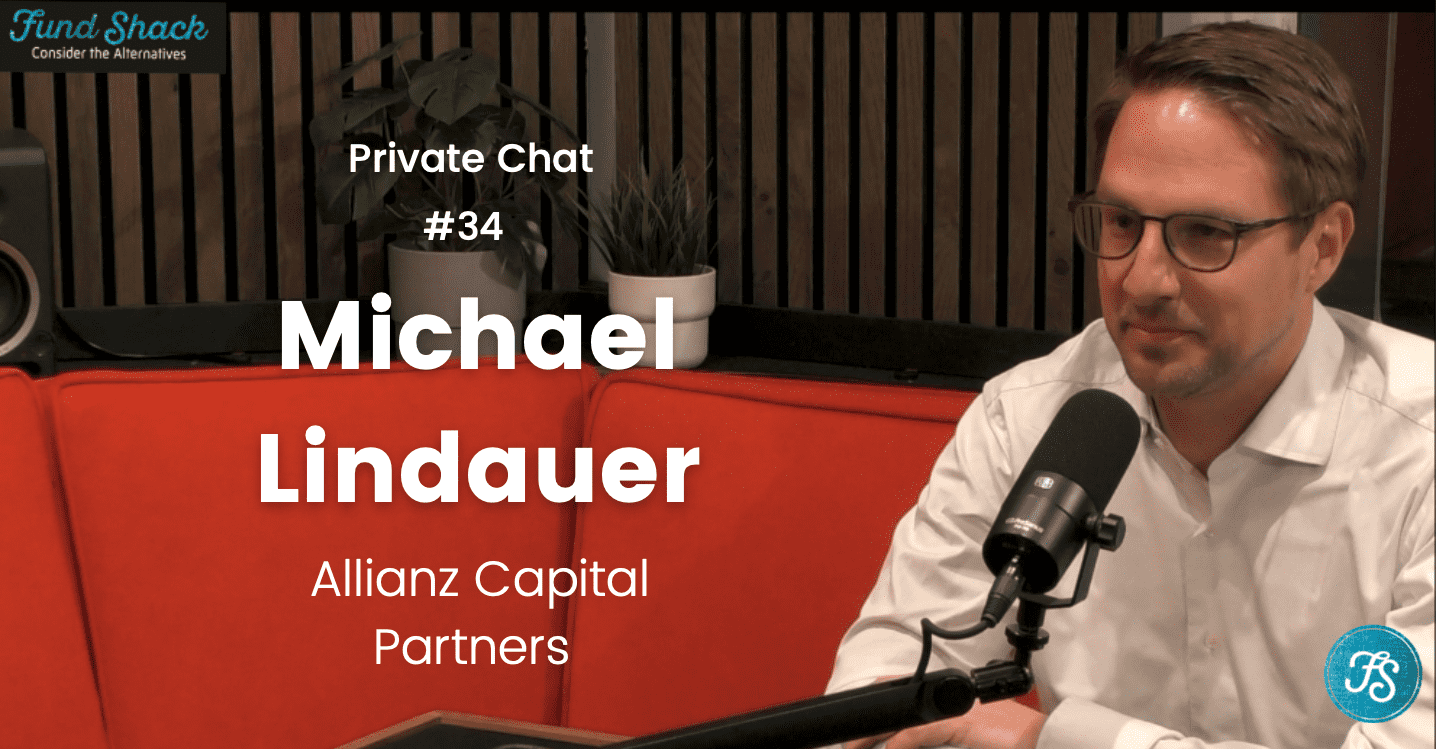What’s going on with private capital fundraising? To find out, Ross Butler of Linear B Group asks Warren Hibbert, founder of Asante Capital Group.
After a splurge by institutional investors during 2021-2022, and a correction in public market valuations creating a ‘denominator effect’, fundraising sources have all but dried up – even for some big name private equity managers.
There is a lot at stake, and while it’s difficult to ‘kill’ a GP, even one poorer vintage can put a manager on the sidelines for a decade.
Warren explains what it all means for managers, when they should get on the road, and what to expect.
Transcript:
[00:00:00] Ross: You’re listening to fund Shack. I’m Ross Butler and today I’m speaking with Warren Hibbert, founder and managing partner of Asante Capital Group. Warren manages global fundraisings for private capital managers, so he maintains relationships with institutional investors across Europe, North America, Middle east and Asia. In this episode, we discuss the difficult states of the private equity fundraising market in 2023, the outlook for the fourth quarter and for 2024, and some top tips for managers going on the road. Enjoy.
Warren, welcome to Fund Shack. We’re approaching the fourth quarter of 2023. I wanted to ask you what the market for private equity fundraising was looking like.
[00:00:42] Warren: I think it’s getting better.
Everything’s relative in this industry, and I’ll explain why I think it’s getting better, but it’s probably easiest to contextualize that in terms of what we’ve seen over the last three years.
So if we dial back to actually 1920, it was a very strange time. Obviously, you had COVID. You had a very poor, a relatively poor fundraising year in 2020.
[00:01:06] Ross: Yeah, there wasn’t much fundraising in 2020, but there wasn’t much capital deployment, I.
[00:01:09] Warren: Seem to remember well, in fact, if you go back to 2008, so if we really look at the broader perspective, the peak, which was back 2007 eight, was about 650,000,000,000 raised. That was eclipsed in 2014. And then you had a record in 2019, well north of a trillion, just under 1.3.
2020 was over a trillion. So it was a good fundraising year, relatively speaking. But it was a down year and it was a very funny time for a relatively brief period post which markets really just took off whilst everyone worked from home, invested from home, et cetera.
And I think it’s a case of no one really knew at that time which way was up. Markets were going crazy, everyone was working from home, you know the story, and we didn’t really know what the outcome would be. In fact, everybody in our industry were pleasantly surprised, regardless of what you were doing and what your role was at how things had gone crazy virtually, and everything was working and it was driving huge efficiencies, right? Yes, on the fundraising side, but across the spectrum, what you had with that was this huge leap in valuations in the market performance and valuations of tech stocks mainly. Tech stocks predominantly. And this is largely a tech story, really. And so what you had, so you had the very few large players who were in the right place, right time from a technology perspective, and the mega caps who were just there now, really asset managers being able to raise incredible amounts of capital off the back of amazing valuations and performance delivery, both in terms of realized and unrealized. And what happened in addition to that is the deployment pace picked up fantastically. And with that increased deployment pace, so the fundraising pace followed very quickly. And so what you had is, instead of funds, generally speaking, going out to market every two to three years, which is a pretty good pace, they were now coming out to market every nine to 14 months.
[00:03:24] Ross: So I am out of date because I was thinking it was. It was more like four to five years, they might go to a mid market manager. So they’re pretty much constantly on the road.
[00:03:33] Warren: It’s a perpetual exercise of fundraising.
[00:03:35] Ross: I mean, they’ve always said that, but now it really is.
[00:03:37] Warren: Right? It really is. It really is. Largely because you’ve always got a product in the market if you’re an asset.
But going back to this period, which was really the 2020, 2021, you had these very large managers raising at a cadence that the market had never seen before. The flip switch that would have put that all to bed was the LPS going, look, we’re just out of capital.
But there was huge fear of missing out syndrome taking place, because those large tech stocks, tech stocks, tech GPS, if you take the top seven, their performance the beginning of 2021 back end of 20, was between four and nine times, net.
So you couldn’t. But you’re going to lose your spot. You had to re up.
[00:04:28] Ross: Were you talking global GPs who have a significant proportion in tech or something?
[00:04:31] Who are predominantly tech
[00:04:32] Warren: Yeah, predominantly tech.
[00:04:33] Ross: Okay. Who were all raising at the time in the sort of low teens to low 20s.
[00:04:37] Warren: Right.
Ross: So it’s not the redistribute distributions are increasing, it’s the fear of missing out that’s driving this.
[00:04:42] Warren: Correct. Allocate. Right, correct. During that period. Yeah. And there were distributions happening.
[00:04:45] Ross: Sure.
[00:04:45] Warren: But, yes, most of it was on paper in terms of the valuation uplift. So what you then had was these managers raising at an incredible cadence, LPS not being able to say no, and particularly the US state pension plan market, which is the largest pool of capital to privates, going, we’ve got to sort of double down. But effectively, we’re having to borrow allocation forward. So they’re committing future years allocation as.
[00:05:10] Ross: They’re eating into 2023.
[00:05:11] Warren: Exactly.
[00:05:12] Ross: Right.
[00:05:12] Warren: So what we saw in 21, and this was around October 21, and it was one specific USA pension we were speaking to at the time. They said, look, we think we’re done for 22.
And we sort of scratched our heads and said, well, hang on a second, you mean you’re done for 21? It’s October 21. No, we’re done for 22. They had effectively pre allocated all of their allocation to their respective managers, existing managers, to the end of 22, so over a year in advance. And that took everyone by surprise. But, whoa, what’s just happened here? Because no one had seen this forward committing, an extent to which it was.
[00:05:50] Ross: Happening, and it’s not a technical thing, it’s like a hype thing.
[00:05:53] Warren: Yeah, completely.
[00:05:54] Ross: My, I didn’t realize this.
[00:05:55] Warren: Okay. And so if you follow that through, and the same again happened in 22, where 23 was pretty much done back end of 22, as far as those managers were concerned, the LPS, what you then had is the correction with that. The LPS had really maxed out to the best extent possible, predominantly into tech, their allocations to the private markets. You had this drop off in public’s massive denominator effect. The distribution started to fall and it was the perfect storm.
And this was all leading into 23. So 22 was a down year, still a pretty good year if you take it in the context of the last decade.
But the first half of 23 actually was the epicenter. So LPs really sitting on their hands, having committed to their existing. Getting a new GP into your portfolio was almost impossible from an LP perspective. And again, I’m talking largely at the large end.
And so just a very difficult time, incredibly difficult fundraising time, because if you’re in our position, raising new capital into funds established or new first time funds, it was now impossible. And we’ll come to how we’ve managed to achieve what we’ve achieved. But it was very, very difficult. And in fact, we just completely put a line through first time funds for some time, which has been reflected in the market stats as well.
[00:07:25] Ross: Well, I have heard even very established brand name mid market managers been on the road for ages now and really surprised me because it’s like, okay, so maybe some of the big California state pension funds overallocated and got caught up in the hype, but we’re talking about global capital pools. You’d think that really good, well known managers that used to have a queue of people lining up, they’re on the road. Is that your experience as well? That there are some really good names still waiting?
[00:07:54] Warren: It’s a big reset for the market and it hasn’t quite played out entirely.
So the market, as you’ve heard and everyone’s heard many times before, invests by looking in the revenue mirror, as they say. So the performance of your 2017, 18, 19 funds is what’s relevant today. What’s happened in 20, 21, 23, it’s largely relevant. That’s money that’s being put into the ground, but you’ve sort of got a stay of execution. It’s really what have you delivered prior?
And everyone’s up against this new benchmark, which is the performance that was generated through 2020, 2021, through these incredibly periods of massive valuations. And there were significant distributions as well. So it wasn’t all on papeR. The VC market has had a very big correction, relatively speaking, not as big as the public’s, but there hasn’t been a significant adjustment on the buyout side in terms of valuations.
It’s just a very challenging time for many, because whilst you’ve been very consistent and generated net, 1.71.82, that doesn’t really stack up to this new paradigm. The new benchmarks that have been created, again, largely tech skewed. Hugely, hugely tech skewed in a way.
[00:09:15] Ross: But does that make sense?
Because the new benchmarks may just be Anomalous and this is one of the issues with the industry, is how do you decide who you’re going to re up with, commit to or in terms of new GPS or otherwise?
Warren: There is a multitude of different factors and performance is one of them.
Team is probably the most significant one. And then it’s a case of what’s the future play? Why is this going to be so interesting going forward?
And I think there are many investors, many GPs out there, who have had to really sharpen their tools and go, okay, we need to up our game. So the performance has been generated fine, that’s an anomaly. And that’s certainly what they’re telling investors. And there’s a premium for consistency. So if we, the GP, have performed consistently through cycle, that gets us lots of points, and it does, but your performance needs to be north of two X net.
[00:10:13] Ross: When you say sharpen their tools, you’re talking about value creation and just.
[00:10:15] Warren: Yeah, how do we show that we’re really cutting edge? Because along with this technology hype and valuation has come technology itself, right? This huge creative of efficiencies and new means of driving value, new means of doing pretty much everything, and those taking advantage of it are at the forefront of technology. So the tech GPs have benefited massively because if they really have domain expertise, they’re going deeper and deeper every day, whereas the more generalist or others that are focused on multiple sectors have been content to just continue on doing what they’re doing with the brand above them that drives these raised funds every vintage, not sort of reflecting on whether their model is world class and relevant. Yeah. And I think relevance probably a bit extreme, but really, is it world class? And I think that’s what’s really interesting because we see it with groups. Groups we meet. So many very well known, have been around forever GPs who really haven’t got the perspective of how the market has moved and how it is moving. It’s a very real time thing.
[00:11:33] Ross: So this really is. It’s all about tech. But I mean, there are large managers who are generalists, but that can really go deeper, can tell their portfolio teams, everyone, invest in AI and see what comes of it or something like that. That must be the case that there are some. Sure, you don’t have to be a.
[00:11:49] Warren: Tech specialist, you don’t have to be a tech specialist, but you do need to reflect on your business model and try and figure out what is the best means of getting to the top of the league table effectively.
[00:12:01] Ross: You said earlier, I think performance is key, but actually team is potentially even more important. What do you mean by team?
[00:12:08] Warren: When an LP goes in to assess a GP, the performance is obviously very important, but performance to an extent can be manipulated, whether it’s valuations, IRR in particular. Right.
As I say, you can’t eat IRR, but that is how many LPs are immunerated today? The majority of them. So it is a huge driver and that can be manipulated to an extent. So what you’re effectively backing is the team who are going to be deploying your capital in the next blind pool that you’re providing for them for the next decade plus.
And you have to have absolute confidence and excitement and conviction that this team, as calibrated, can deliver that.
And so the numbers are really important, but if the team is not fit for purpose or you have question marks over it, it really doesn’t matter what the prior performance was. Yes, and that’s why it is so, so important, particularly where there’s team change or evolution, succession, et cetera.
[00:13:13] Ross: Presumably when you talk about team, then it’s about assessing the individuals, but it’s also assessing the cohesiveness of those individuals working together and the organizational structure and whether that’s credible and all of that.
[00:13:23] Warren: Correct. And the alignment. Can I quite easily figure out what this team is going to look like in the next decade?
It’s not next year or even the next fund, but it’s the next two funds.
[00:13:34] Ross: You mentioned the market’s bifurcated and always has been, but presumably that becomes ever more polarized, the tougher the conditions get. Are there people that can still go out and just raise at the snap of the fingers or not?
[00:13:47] Warren: Yes, there are, but it’s the very few. So roughly today, if you assume that a trillion just over is raised every year up here or down year, I think this year would be just over a trillion. Still, although it’s a down year, the top ten managers take roughly 30% of that. That’s the top ten. The top 10% take north of 80%. So it’s massive bifurcation. So we saw this really become a significant thing post 2008.
The bifurcation didn’t exist to the same extent prior to that. And in fact, we saw that day to day. So raising funds pre 2000 and eight’s correction, everyone raised. Everyone raised. If you were out of investment bank or you were out of a consultant and you decided, I’ve got this thing and I’m going to focus on this region doing this, even if it was generalist, you were always going to raise how quickly you’d raise question mark, whether it hit your hard cap question mark. But you’d get into business. Yeah, post 2008, that’s not the case.
And so there’s massive survivorship bias in all the numbers post that period, to a far greater extent than pre. And then post 2020, albeit not a financial crisis, you had the same. So it’s the sort of rush to safe harbor, which is the megacap asset managers in a way. And so they’ve been able to really get a leap on. They’ve also been way ahead of the curve in terms of applying technology and thinking about their business.
And that’s an all too obvious but very interesting way of looking at things. You’ve got these groups called GPS, general partners who go around buying up businesses to create a portfolio and driving huge value by creating better businesses, looking at all different elements of the stack and going, how do we make this much, much better, bigger, more global, whatever the case may be, very few put a mirror up and go, let’s have a look at our own firm. And that’s kind of what I’m talking about is there are many groups and there are many GPs out there with a fantastic value creation stack with great means of driving huge value that still aren’t looking at themselves.
The management company is something you sort of drag along whilst you’re investing in these businesses, but their businesses have become significant businesses and there’s a lot you can do with them and you really have to be ambitious and work out where are you going in the next 1020 years relative to your peers, because it is such a fast moving market.
[00:16:33] Ross: So that matters when you’re actually raising a fund. LPs want to know that you’ve got a plan for your own money, because to some degree, I’ve got sympathy with the idea that let’s not focus, let’s not be too introspective, let’s just make money, let’s just create value in the portfolio companies, and let’s not worry too much about how things land internally.
[00:16:55] Warren: If you do that very successfully, and you usually find they go hand in hand, the introspection, and focus on your portfolio. But if you do that very, very successfully, those types of individuals and teams will be doing it on their own business inherently. That’s my view. And as a result, if you’re generating fantastic performance, so raising capital is fairly easy, and that’s the key element to growth, is primary capital raising. There’s a multitude of other things more on the secondary side that has been built in to augment that. But really, raising primary capital is the game.
Now, not everyone has a perfect vintage every time. From a performance perspective. There are some that are super consistent and very, very good, but we’re really getting to the top echelon 1%.
Everyone else is going to have a tough portfolio company and or even a tough vintage. And those can put you back on the sidelines for a decade plus, because it’s a very long term game. And whilst it’s very difficult to kill a GP who perhaps shouldn’t be around, it’s also very difficult for those GPs, particularly of even relative scale, to shift the direction of the tanker.
[00:18:10] Ross: So we’ve been talking about the extremes to some degree. We’ve been talking about the people that can raise really quickly, and we’ve been talking about the fact that not everyone will raise, actually, but the vast majority of people presumably are in the middle. They’re decent enough and they deserve to survive, but it’s a really tough market.
What should they be thinking?
Should they be conceding things? And are terms changing? And what’s happening in the mass middle?
[00:18:36] Warren: Terms aren’t changing massively. It’s always been a topic where, particularly through crisis, everyone switches to, well, the terms are now going to change.
Terms adjust relative to supply and demand, relative to each GP specifically. So there’s still GPS out there attracting premium terms through cycle.
Again, we’re talking back to the top 1%, everyone else, it evolves. So as you grow your Aum, as you get to a billion plus in terms of fund size, so you’re not getting 2% on your money anymore, but the 20% is rock solid. And then you now have continuation vehicles as well, upon which they’re earning economics.
And you can get quite creative on that front in terms of the degree of carry, in terms of ratcheting it.
[00:19:22] Ross: Up and down, because that’s newer, so they can play around with them.
[00:19:25] Warren: Exactly right. It’s less set in stone, but by and large you’re finding that GPs will continue to exist and raise capital. And even through crisis, they’re not conceding too much.
It’s more a question of how much can you raise? It really comes down to that you’re never going to go out and there isn’t a market clearing price per GPS, so you can’t go out and say, well, we’re not great or we’ve just had a rough ride. But inherently we think we’ve got a really good toolkit and we can drive value in the next vintage because we’ve learned from our mistakes, which all genuinely is pretty good. But the market will decide effectively how much you can raise, and that’s it. At set terms, you can’t sort of go, well, okay, we’re going to charge 5% carry and we’ll charge a few basis points of management fee and we’ll just suck it up for the next vintage because you won’t get anything at that point because the writing is on the wall.
[00:20:27] Ross: Cheeky question, but what kind of proportion difference does having a good placement agent make?
[00:20:33] Warren: Everything.
I think it depends on your scale. You take the host of child in Europe being EQT, who have one of the largest placement agents in the world, effectively in house.
They’ve got over 100 people focused on building out their AUM, and they do it very, very effectively.
You need a group focused on driving value in the area of capital raising at that scale, but ideally all the time. In the same way that you’d have a group focused on driving operational value within your portfolio companies, you need someone to be working on. How do you grow your business from an AUM perspective? And I think that’s something that many GPs haven’t quite got yet, which presumably.
[00:21:21] Ross: You need economies of scale in order.
[00:21:23] Warren: To you do in house or externally?
[00:21:26] Ross: Yes, one way or another.
[00:21:28] Warren: One way or another. One way or another, you need it.
And most importantly, it’s recognizing, and we can debate whether it’s 50 50, but I would certainly argue that 50% of your business is raising capital, at least 50%, whereas many believe that we’re out there to go do deals. We’re out there to go do deals, drive value and generate returns for our investors. And every couple of years, and amazingly, it shouldn’t be the case. But many still believe this, every couple of years, we’ll hit the light switch and raise more money. And those in that camp probably not going to raise again unless their performance has just been amazing. And if your performance is consistently fantastic, you raise yourself. That’s fine, that’s easy. And you probably need one IR person, really, just to make sure that everything’s running smoothly. But investors are marching to your steps, so that’s fairly straightforward. But again, it’s kind of irrelevant to discussion because there’s so few in that zone. So having a party, internal or external, who has a perspective and day to day, is watching what LPs are doing, particularly in today’s markets, where I still believe no one knows which way is up, is critical.
[00:22:40] Ross: Yeah.
Are there any differences between the North American fundraising market and Europe at the moment?
[00:22:46] Warren: Sure have been for a long, long time, simply because the largest pool of capital, privates, is in the US and will be for some time to come. It’s moving slowly only because the US is a very mature market. And so the element that is the largest, which is the US state pension plan market, is sort of tapping out at its maximum allocation to private equity. So that’ll continue to move ahead, but the growth is getting to the point where it’s going to be ceded to other groups, sovereign wealth, other large pensions, less so Europe and more Asia, and to the extent, the Middle East. So that’s quite interesting.
But you’re finding that really, the US has been such a strong market and the predominance of capital has been so favored towards North America, that in tandem with the fact that it’s the oldest, so they’ve learnt more, it’s a far more developed market. The returns have been better.
Getting in your car and driving down the road to your investor is very easy. And from the investor’s perspective, investing in your backyard, from a currency perspective, et cetera, has been pretty easy. So it’s been self fulfilling to a large extent, and has remained that way for a while. It’s been more a question from that market question for the US market as to how they diversify and whether they even need to.
And for quite a period post 2008, there was a retrenching back to, let’s just do it in our backyard.
Then only in 20, 16, 17 did we start to see them really going, we need to rebalance into Europe. Not 50 50, but we need to put more into Europe.
And that pulled back again post 2020, but is now starting off. It’s kicking off again. But Europe is a market where there have always been many questions around. To what extent do you need to be in Europe if you’re getting the returns and the diversity in terms of type of manager in our backyard in North America, predominantly the US.
And the only other real question was, okay, so how exposed do we want to be to Asia? Because Asia is moving really quickly. China is super interesting and we’ve got to be there until they can’t be there. And so that is a change now that we’re seeing where that may actually favor Europe.
[00:25:10] Ross: Right.
[00:25:11] Warren: Because that capital will shift across.
[00:25:13] Ross: So the domestic pools of capital, what kind of proportion, in terms of European GPs looking to raise money?
North America, obviously hugely important, but there are domestic sources of are.
[00:25:25] Warren: But the European market is a much smaller market. But yes, and just as a general rule, your local investors are going to be the ones that know you best, know you personally as a GP, because you dine at the same restaurants, whatever the case may be. And you always see that natural affinities, where, in fact, if your local pensions are not invested in you, investors outside your region start to go, well, how good are you?
[00:25:51] Ross: Yes, proximity matters, doesn’t it? And then there’s the kind of cultural things. And the topic of ESG feeds into this to some degree, because that’s become kind of a polarized issue in the US itself, but also between North America and Europe. And Europe is very much pro and not all of North America is. And so a topic like mean, that’s a delicate one to tread through.
[00:26:16] Warren: Is it? It’s a complicated one because it’s a question, I think, in many minds, as to what extent it’s window dressing versus genuine impact. And there’s ESG, but there’s impact, and there’s a ton of ways to describe what GPs are trying to do. Many with the right intent, some with a question of trying to attract capital from those LPs that are just focused on impact or ESG. And when you distill it, the reality is investors that are focused on impact and ESG is a significant proportion of investors. It doesn’t mean they’re impact and ESG investors. It doesn’t mean if you label your product ESG that you’re immediately going to raise capital from those investors.
Investors are still looking for the same simple things, strong team, great track record, and if you’re doing the right things for the society and the world, which most the best GPs are anyway. They’ve just rebranded as ESG and impact. Fantastic. You tick the boxes and you raise money, but not the other way around.
[00:27:21] Ross: Yeah. So maybe the lesson there is not to get too obsessed with the labeling and actually just do the.
[00:27:27] Warren: Do it properly. It’s one of those things. The understatement works if you do it well. And we’ve actually had this with a GP recently where we’ve had investors go, actually, we’re going to put you in our impact bucket. But they’re not an impact GP.
But the reporting is phenomenal and they really care about it and they do a lot of it, but that wasn’t the reason they got into business.
[00:27:49] Ross: We’ve relatively recently seen the rise of private credit funds as well. How’s that affecting, let’s say, the overall balance of the opportunity set if you’re a fundraising as a private markets manager, is that eating up some of the private equity allocation?
[00:28:04] Warren: No. So separate, separately separate in many instances, separate teams on the LP side reviewing the propositions.
A lot of that capital has come out of the fixed income buckets and that entire market has come to be what it is today, which is this juggernaut post 2008 as well. So you had the global financial crisis happen. Investors were desperate for yield for just some degree of cash back because it was pretty barren, it was just desert. Were you ever going to get your capital back, regardless of what strategy you were investing in?
And on top of that, very obviously, the banks were in a tough position, to say the least. So this credit fund market came to be and has grown incredibly since. But a significant portion of that has come out of the allocation to fixed income. What’s going to be interesting going forward, and it’s here to stay, there’s no question the banks are going to be in, are going to have ups and downs at infinitum, in my view, but they certainly have a bit of a tough time now, and that’ll happen through crisis, because we push the limits in the industry all the time and the credit funds are better able and aligned to fix things versus try and take the keys, which actually makes it a bit of a smoother landing when you do go through the downs and more attractive to GPs and more attractive to GPs and they’re able to take more risk, et cetera, they understand the assets better. Their approach is from the inside, as opposed to from a sort of banking perspective, where you’re just a line item of thousands.
That said, what is going to be interesting is the extent to which that capital starts to flow back to fixed income now that you have a pretty attractive yield coming through and how that starts to now compete with fixed income, which was zero. Therefore, of course, you moved it across and that’s massive. I mean, the fixed income market is larger than the public equity markets. The fixed income market is so large, it’s circa 130,000,000,000,000 that a very small proportion was shifted across into privates. It’s not all going to shift back. Sort of. No one’s really noticed, is my view.
[00:30:26] Ross: Yeah. It might just be worth keeping your hand in as a large institutional investor into the private credit market, just completely.
What’s your view on private credit? Because in terms of we got a rising rate environment and let’s say it plateaus here, or slightly higher, does it grow over the medium term in that environment, or does it require a low interest rate environment to become, to grow in the way that private equity has grown in the last decade?
[00:30:53] Warren: I don’t think it’s going to grow to the same extent it has over the last decade plus because it’s really gone from zero to hero quite quickly because your competitor was your competition, being largely the fixed income bond market, was at basis points, and you could deliver net sort of six to early teens, even on the senior secured side. So that’s very, very interesting. But you had no competition. You now effectively have competition for capital. And that, I think, is going to mean that they’ve got to fight a bit harder. But you’re also going to have this and you really have that. This bifurcation is going to become even more extreme. So it’s going to be those that are quasi banks who can really provide any financial solution for you.
[00:31:45] Ross: And what’s your kind of medium term outlook on the private equity fundraising market as a whole? You started by saying, by being kind of cautiously optimistic.
[00:31:58] Warren: Back to that discussion around where the market is and why 2022 and 23 are going to be tough fundraising years. Our view is 24 will look a bit like 22, and so we’re potentially back to a steady fundraising environment in 25. That’s our view anyway.
But the epicenter was the first half of this year and you can see the sentiment marginally improving, which is why I emphasized relative, it’s marginally improving. Investors are starting to get a little bit excited about what is to come in 24, where we haven’t seen that for quite some time now, which is great, and there’s capital out there. As I said, if you look at the fundraising statistics year on year, we’re in a period that’s way up on where it was a decade ago. You’re having up and down years for sure, but it’s still in the trillion plus, and I don’t see it changing dramatically. It’s just where that’s going.
Everyone sort of thinks on it as a very big market, which it is, and there’s plenty of capital out there if you’re, if you’re raising roughly a trillion two every year.
But if that’s only going to a handful of managers, for the most part, how do I, as one of those marginal managers, raise money? That’s, that’s the big thing. And that comes back to your point, around some very established groups who will raise, but are going to miss their targets, in some cases dramatically. They will continue on, but that’s going to be the story to watch is to what extent do they walk away and go, okay, well, we’re still around, we’ve raised money, we might not be able to do as many deals. It might be a slightly more concentrated portfolio stroke. We may take advantage of a lot more co invest. Not a bad thing for LPs to deploy into our assets and build up again. But what do we need to change such that that never happens again?
If you go on as well, it was just a tough environment.
When we raise our next fund in 26, everything will be fine again. You’re in trouble.
[00:34:03] Ross: Yeah. What’s your top tip? In the heat of the moment, you’ve got a fund to raise your top tip to a GP. What’s the common mistake that you’d watch out for something like that?
[00:34:12] Warren: Yeah, there’s one. So we have a diligence questionnaire where GPS always list out their common most or their key lessons learned. And the most common lesson learned is we didn’t replace management quick enough. Every GP’s got that lesson learned. If you would apply that to fundraising, it’s. We went out too early.
So that’s my piece of advice, is if you’re going to, before you plan to go out, you need to have a pretty good sense on what your fundraising is going to look like before you launch. You’ve got to have a very good sense on at least 50% of your capital that you want to raise and when that’s going to come and from whom before you launch.
And as you mentioned earlier, it is a perpetual exercise. So you’re always fundraising, even if you’ve only got one product, you should be speaking to your investors and spending a lot of time with them such that you can get the answers from them around. Are you there to support me and for how much? WheN I launch the next fund, that’s your existing investors, then you’ve got to do the same for new.
You should have a far greater degree of certainty around your existings, obviously, than your new. But I say obviously, actually not in today’s environment. So many investors, certainly through the last two vintages, have switched out of existing managers into new, or have had the problem of not being able to re up with all their existings simply because they didn’t have the allocation and the capital. So it’s been tough and you’ve got to have that perspective, which means you really need to make sure that you’ve actually mined the markets in your pre marketing exercise very, very carefully. Right.
[00:35:50] Ross: The readiness is all?
[00:35:51] Warren: Yeah.
[00:35:51] Ross: How long have you been doing this?
[00:35:53] Warren: Roughly 20 years.
[00:35:55] Ross: Right. And you set up your firm?
[00:35:58] Warren: Yes.
[00:35:58] Ross How’s that?
[00:35:59] Warren: 13 years ago. Fantastic.
Really good. It’s never a straight line, like most things in life, but ours has been a pretty extreme curve through the last 13.
It’s just a lot of fun, and that sounds fairly fluffy. But the most important thing to us, as we keep on saying, is the culture of the firm. And if you’re having fun, that’s everything, because everything comes with that. If you’ve got a team that are motivated, aligned and having fun, it’s like having a boat with four big engines.
And a lot of the good things come from that. It’s become more challenging as we’ve grown, obviously, as it does, particularly when everyone’s not under one roof.
So we’ve got five offices around the world, 74 people, and it’s maintaining a singular culture and that drive, passion and energy, that is something we spend a lot of time on every day doing.
[00:37:02] Ross: Sounds like a good culture and philosophy.
Well, thanks for coming on the show, Orange. Lovely speaking with you.
[00:37:06] Warren: Thanks for having me. Lots of fun.
Fund Shack is produced by Linear B Group, a full service media, design and editorial production company, focused on financial services.
